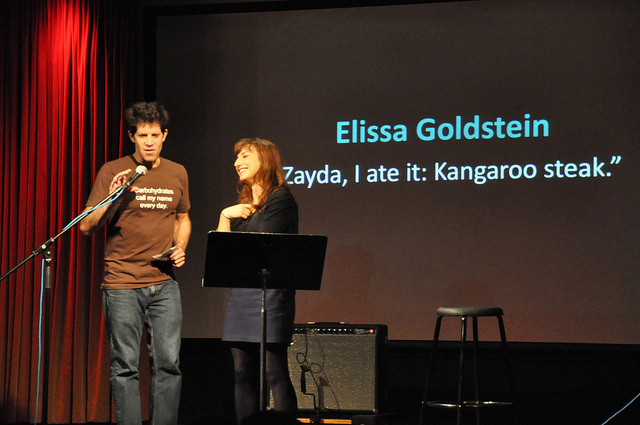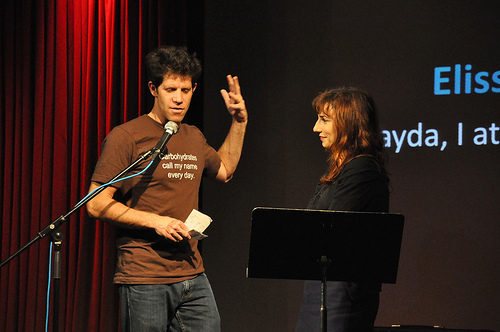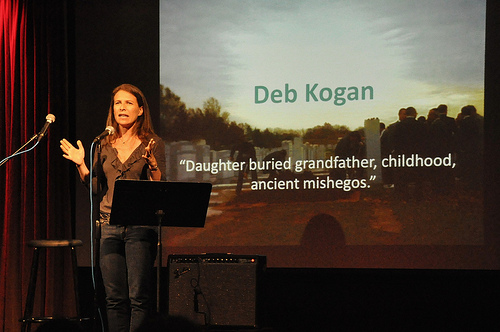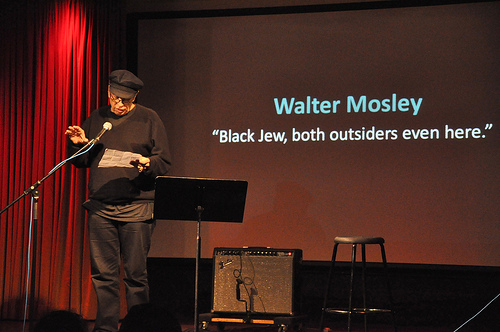Tag : Sonia Isard
July 15, 2014 by admin
From Russia, with Narrative
I read Panic in a Suitcase, the debut novel by Yelena Akhtiorskaya, by the ocean. At Brighton Beach, in fact—the fertile backdrop for this chaotic family saga. Reading the story on the shores of the Atlantic, it was easy to imagine the sundry oddball siblings stalking across the streets and into the bodegas and bakeries of Brooklyn’s “little Odessa by the sea.”
The remarkable corporeality of this vision emerges thanks to the surprising and vivid detail in Akhtiorskaya’s writing. In this novel of hectic depths, a Russian Jewish family of dissatisfied misfits emigrates from Ukraine to Brooklyn. The characters are characters indeed, trying to make a home for themselves on Coney Island Avenue, “a street where cars had many lanes but still bunched together and tiny people on the tiny strips of sidewalk seemed to be crossing a desert.“
In the Nasmertov family, every generation is unsettled in its own way. There’s the linchpin, the distracted Pasha—a spacey poet of indeterminate success who can’t decide whether to remain in Ukraine or finally join his family in Brooklyn. His sister Marina, who is fired from her job cleaning houses when she gives pepperoni pizza to the son of her Orthodox employers. Pasha’s father (who had no temper to lose) and mother (“Prisoners in labor camps hadn’t exerted themselves at an equivalent level of intensity for such hopeless durations”). And his niece Frida —poor Frida: “Impressive applied to Frida meant that she wear a dress and sit at the table. No one expected smiles, precocious conversation, grace.” The Nasmertovs are never quite at home in Russian-speaking Brooklyn, yet are far removed from their family and friends in Ukraine, and perhaps farthest of all from the Manhattan right above them.
In Lena Finkle’s Magic Barrel, a gorgeous graphic novel by the celebrated artist and author Anya Ulinich, the path from Russia to New York (and back, and forth) fades a bit more into the background of the winding story. Here we have one central protagonist —a warm, smart, wounded woman who emerges from years of cold or abusive relationships with two children and a lifetime’s worth of sexual confusion.
She embarks on a quest to find love (or is that sexual fulfillment? intimacy? stability?) while juggling single parenthood and a precarious yet successful enough career as a novelist. “I became a tourist in the country of men,” she writes, “or at least in the New York metropolitan area of men. I was like people who, when they felt like a road trip, shut their eyes, pointed to a random spot on a map, and drove…”
Lena’s insecurities and narcissism are deeply sympathetic. She berates herself—“What is it with you immigrants? Why are you so afraid of yourselves? … For all your proclaimed affection for Dostoevsky, you’re an excellent immigrant child, Finkle, a.k.a. a smart drone!” Lena traces her life in relationships, marks time by counting men, and avoids her work by browsing on OkCupid.
The imperfect, floundering characters in these two novels are deeply relatable. They leave you with the distinct impression that each person, each family, is no more or less unhinged and absurd than any other. In the midst of these distinctive migrations, it is the emotional familiarity of these characters that makes each one so compelling.
- No Comments
April 8, 2014 by admin
Powerful Intimacies in Both Old Country and New
In The Scent of Pine, a new novel by the celebrated writer Lara Vapnyar, a struggling college lecturer away from her husband and children at an academic conference falls into an uncharacteristic affair with a charismatic and successful professor. Already long alienated from her floundering marriage, Lena finds surprising intimacy in the affair and begins to plumb her personal history as the budding relationship loosens her inhibitions and lethargy.
Two unfolding stories are skillfully interwoven — the illicit present-day romance between Lena and Ben in New England, and Lena’s coming-of-age at summer camp in the Soviet Union, which she recounts to Ben in intimate detail over the course of their tryst. Yet, “The camp story will be over sooner or later. As will the story of Lena and Ben. If only she could learn some of Scheherazade’s storytelling magic and make it last,” Lena thinks to herself. A lingering mystery from summer camp days emerges through Lena’s narration, connecting the story and the storyteller across time and space.
The UnAmericans, a debut short story collection by the young and talented Molly Antopol, covers similar geographic terrain. Ranging across Eastern Europe, America and Israel, each short story has a sharp poignancy, a surprisingly bittersweet vulnerability.
In “The Old World,” a well-intentioned second marriage comes up deeply, heartbreakingly short. The disappointed disappointing husband wonders, “How had I let myself become just another sad old man at a table for one?” In “Minor Heroics,” sibling rivalry and sibling love overlap and intertwine on kibbutz. Oren has always envied and admired his older brother Assaf — but when Assaf is severely wounded in a tractor accident the roles are reversed, and Oren can’t bear his own newfound dominance over his brother. In “Retrospective,” Mira’s marriage may or may not be disintegrating — coinciding with the death of her domineering, withholding, fabulously wealthy grandmother. She cries to her husband, “You don’t understand what it’s like to be with someone who exists so fully in his head. Who has no desire to leave our weird little cocoon.”
In both The UnAmericans and The Scent of Pine, the authors employ a deceptive simplicity in their writing. The tropes, the dialogue — even the archetypal characters — are in some ways familiar, bordering even on predictable. The ambiance and appeal of Eastern Europe, and of Eastern European descendants in America, are also well-trodden fiction terrain (thanks in no small part to the success of Vapnyar and her thriving cohort).
Yet Antopol and Vapynar share a deep and devastating gift for eliciting extraordinary emotional reaction from the recognizable intimacies of relationships. The sharp pain of suddenly seeing a parent’s weakness exposed, the bright starkness of a partner’s insecurity or disregard, the thrill of sexual conquest — these fundamental experiences are conveyed in such bare, compelling, unaffected voice that it is virtually impossible not to recognize yourself in every different character in these two excellent books. The familiar territory of the books makes the unexpected emotional impact of the stories all the stronger.
Sonia Isard is a Lilith contributing editor.
- No Comments
October 18, 2011 by Sonia Isard
Occupy Your Mind
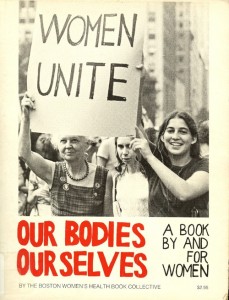
http://www.ourbodiesourselves.org
Looking for a little light reading as you Occupy [Wall Street/Judaism/what have you]? You’re not alone. Elizabeth Gumport reports back on “the missing—or lost!—link between health class and internet pornography” that is Our Bodies, Ourselves. Thank you, People’s Library, for reminding us to find new meaning in the classics!
- No Comments
October 17, 2011 by Sonia Isard
What's the Impact of Praying in Public?
 Forward editor Jane Eisner’s incisive commentary on Occupy Judaism: She says Kol Nidre at OWS marked “a small but significant turning point for both Jews and progressive causes, a sign of arrival for Jews and a return to the historic place that religion played in the public face of progressive activism.” I’m also interested in (and more ambivalent about) the public face of progressive Judaism — how does the meaning of Jewish practice change when the deeply moving yet sort of raw and untamed Kol Nidre liturgy rings out across Zuccotti Park?
Forward editor Jane Eisner’s incisive commentary on Occupy Judaism: She says Kol Nidre at OWS marked “a small but significant turning point for both Jews and progressive causes, a sign of arrival for Jews and a return to the historic place that religion played in the public face of progressive activism.” I’m also interested in (and more ambivalent about) the public face of progressive Judaism — how does the meaning of Jewish practice change when the deeply moving yet sort of raw and untamed Kol Nidre liturgy rings out across Zuccotti Park?
- No Comments
October 11, 2011 by Sonia Isard
Paint Yourself Out

Eva Hesse, No Title (detail), 1960. http://www.brooklynmuseum.org
“The hell with them all. Paint yourself out, through and through, it will come by you alone. You must come to terms with your own work not with any other being.” You tell ’em! Read this excellent piece about the new Eva Hesse exhibit (and about her family’s escape from Europe in 1938), and then go right away to see the show at the Brooklyn Museum.
- No Comments
October 4, 2011 by Sonia Isard
Lilith Intern Takes the Stage!
Elissa Goldstein emerged victorious! Her six-word story was a winner at the recent Jewish memoir competition run by Tablet magazine and Smith magazine. See below for more pics from the occasion, which also featured Deborah Copaken Kogan and Walter Mosley! Congratulations, Elissa!
- No Comments
July 26, 2011 by Sonia Isard
The Anxiety of Influence: Amy Winehouse and the Power of Pop
 Amy Winehouse made pop music into magic, into high art. She had a genius for rhythm, an uncanny ear for melody, and an extraordinary knowledge of how to take advantage of her matchless voice.
Amy Winehouse made pop music into magic, into high art. She had a genius for rhythm, an uncanny ear for melody, and an extraordinary knowledge of how to take advantage of her matchless voice.
From the first time I heard Back to Black (2006), what grabbed me about Winehouse’s music was the richness of the production—she understood that the heart of great pop is the depth, the layering, of its sound. Because of her ability to build her music like the layers of an oil painting, every song on that album is drenched in the abundant influences of pop music history—from blues to rap to R&B to jazz. It’s not just that her music is beautiful, catchy, entertaining, ridiculously funny, chilling—her music is smart. As Sasha Frere-Jones writes, “She sounded like an original sixties soul star, developed when the landscape had no rules.”
The complexity of her identity—Jew, Brit, unabashed adorer of Black American music—was part of what gave her enigmatic presence so much power and so much productive tension. Her fearlessness in her music allowed her to play with nostalgia while fundamentally changing the face and direction of women’s blue-eyed soul (see: Adele, Duffy) and maybe popular music entirely.
Her death on Jul 23, 2011, was heart-breaking, and tragic, and horribly unsurprising. May her memory be for a blessing.
- No Comments
May 11, 2011 by Sonia Isard
The Spin Cycle: Another Look at Hillary Clinton and the Photoshop Fiasco
 In the immediate aftermath of Bin Laden’s death, the meme-conducive photo of Obama, et. al., in the Situation Room quickly made the rounds. Some of the digital manipulations were quite satisfying— President Obama holding a video game controller, or Keanu Reeves sitting at the table, calmly participant-observing.
In the immediate aftermath of Bin Laden’s death, the meme-conducive photo of Obama, et. al., in the Situation Room quickly made the rounds. Some of the digital manipulations were quite satisfying— President Obama holding a video game controller, or Keanu Reeves sitting at the table, calmly participant-observing.
Then, whoops! Just as fast as a squirrel can photobomb your vacation shot, it turns out women can be taken out of the picture.
NPR and the Washington Post reported that Di Tzaytung (a Brooklyn-based Orthodox weekly) had deleted Hillary Clinton and Audrey Tomason from the now-famous photo. This got picked up in the Jewish blogosphere and in the feminist blogosphere and pretty much everywhere else—it’s such a clunky and unsophisticated example of tsnius that it’s hard to pass up the opportunity to mock. I mean, talk about low-hanging fruit! There’s nothing as funny as an obviously botched and misguided photoshop job.
Di Tzaytung responded to the uproar, writing: “Our editorial policies are guided by a Rabbinical Board and because of laws of modesty, does not allow for the publishing of photos of women.” Which, hmmm.
But ok, big surprise, some Orthodox men are trying to efface women from the big picture. What else is new?
I think this event reflects more our ever-changing ideas of evidence and proof—the role of imagery in today’s information-rich architecture of communication. Incidentally, the larger coincident debates—whether or not to release photos of Osama Bin Laden’s corpse, or President Obama’s decision to release his long-form birth certificate—are another side of the same coin. By now, the photoshopped slimming down of models and actresses is taken for granted. But the realization that “facts” can be manipulated as easily as women’s bodies? That’s just starting to sink in.
Why is this a feminist issue? For me, it brings to mind some of Judith Butler’s writings on censorship. “Censorship is a productive form of power: it is not merely privative, but formative as well. I propose that censorship seeks to produce subjects according to explicit and implicit norms…” That’s the formation of discourse that she’s talking about—and we’re talking about a stark reminder of how powerful the patriarchal system is in Orthodoxy.
This censorial act was a reminder that politicized censorship has a role, and that it has broad implications for the dispersal of power within and across communities, both Jewish and non. This case just happens to have been ridiculously obvious.
Photography is far more manipulable than we tend to remember, especially in this day and age, when everyone has a point and shoot and their very own mouse to then point and click with. Roland Barthes wrote in Camera Lucida, “The Photograph is violent: not because it shows violent things, but because on each occasion it fills the sight by force, and because in it nothing can be refused or transformed…” Oh dear… Those were the days…
- 6 Comments
October 11, 2010 by Sonia Isard
The Spin Cycle:Happy National Coming Out Day…?
Welcome back to The Spin Cycle, Lilith’s online forum for media analysis.
 I think it started with an article in The Nation. Or maybe it was over at good ol’ HuffPo. Or maybe it was Ellen DeGeneres? I’m not sure. All I know is that one particular topic sure is getting a lot of coverage these days. Seriously. It’s all over my newsfeed.
I think it started with an article in The Nation. Or maybe it was over at good ol’ HuffPo. Or maybe it was Ellen DeGeneres? I’m not sure. All I know is that one particular topic sure is getting a lot of coverage these days. Seriously. It’s all over my newsfeed.
The amazing thing is the tech piece. Good things: Dan Savage initiating the creation of an archive of personal stories on YouTube. The extraordinary Make It Better project. Sarah Silverman’s badass indictment of anti-gay policy, also a YouTube victory. Bad things: The (gay) president of the University of Michigan student assembly getting harassed by the state’s assistant attorney general, via a blog dedicated solely to that appalling purpose. The secretly recorded video of the student at Rutgers, which, blame-games aside, seems to have provided the impetus for a young man to take his own life. (more…)
- No Comments
July 23, 2010 by Sonia Isard
The Spin Cycle: Shirley Sherrod Shifts the Paradigm
Welcome back to The Spin Cycle, Lilith’s online forum for media analysis.

Racism, sexism, and the real-life political power of modern media played out with a vengeance this week in the total horror-show of Shirley Sherrod’s firing from her position at the U.S. Department of Agriculture. Over twenty years ago, this woman of color publicly struggled to come to terms with the personal implications of the systemic racism that defined her childhood and later civil rights work.
Then, this week, Fox News repeatedly aired a decontextualized and heavily edited clip, purporting to prove Sherrod’s anti-white racism, based on a lecture she had given at the NAACP. Sherrod was then summarily hung out to dry by the conservative media machine, the federal government, and the NAACP.
Later retractions aside, these initial reactions mark a gut-wrenching willingness to willfully ignore the past and present role of race and racism, and gender and sexism, in American society.
- No Comments
 Please wait...
Please wait...
